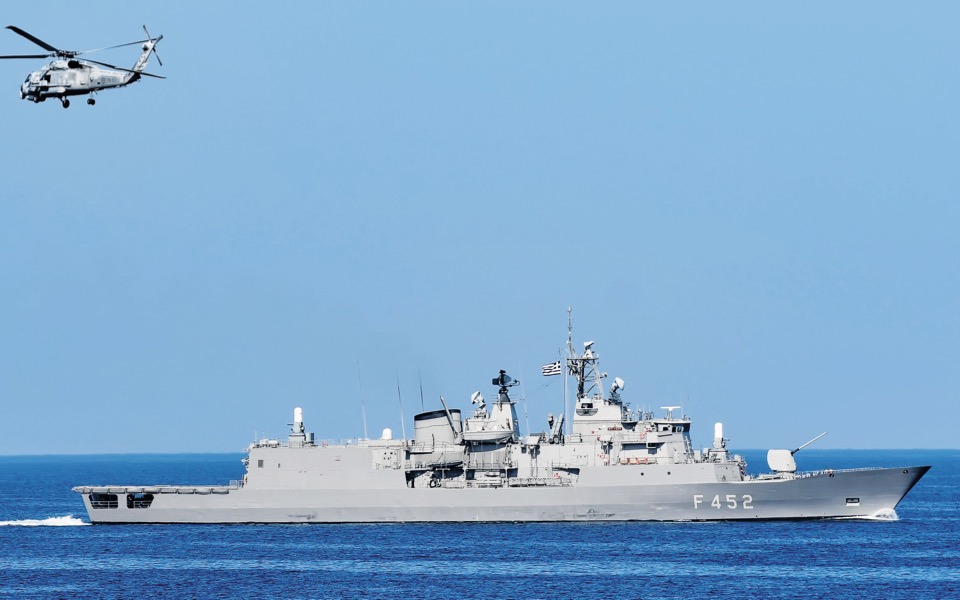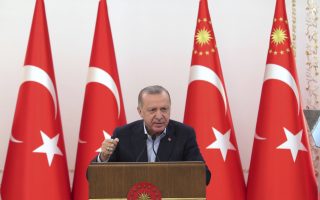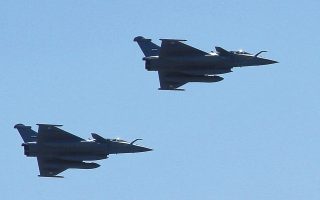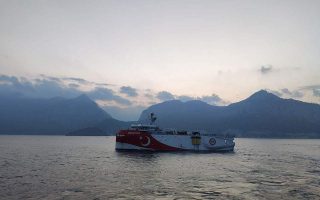From 1988 to 2060, a journey to the future with a Belharra warship

How far back does 1988 feel today? Let us recollect some events from the era to give us a better feeling of the temporal distance. We were still in ecstasy over winning basketball’s European Cup the previous year, the Koskotas scandal had just hit the news, and Andreas Papandreou had returned from London, where he had undergone heart surgery, and marked his return to Athens with history’s most famous wave.
That year was also the last time we decided as a country to place a purchase order for frigates. One need only consider how much both technology and our lives have changed over those 33 years to realize the imperative need of acquiring the new frigates announced a few days ago by Prime Minister Kyriakos Mitsotakis in Paris.
The Hydra frigate, the first of the four most recent frigates we currently operate, first sailed in the waters of the Aegean in 1992, before there were mobile networks in Greece and before the internet was publicly available. I actually had the honor of serving aboard the Hydra as a young officer between 2004 and 2006, and to my great surprise saw that the computers connected to the weapons system of our most advanced surface unit were equivalent to my personal computer as a teenager. Naturally, this specific frigate is still absolutely fully operational, but it is vital to be aware of the general situation when we still have frigates that have surpassed 40 years of active service.
Unfortunately, any hope of modernization for many of these crucial military units was quietly extinguished during the decade of the financial crisis, while many others still remain in service mostly due to the inventiveness and ingenuity of their Hellenic Navy crews.
The Hellenic Navy crews found themselves pushing these obsolete technologies to their very limit last summer, during the biggest crisis with Turkey in 25 years. Operating with hulls that had long reached the end of their lifecycle, most frigate crews contributed to countering Turkish aggression due to their undeniable diligence rather than their military armaments.
Last year’s experience has made it very clear that relations with a revisionist Turkey will continue to grow sour, making the need for a revamped navy even more of a necessity. Over the last two decades, Turkey has doubled the size of its fleet and fostered the growth of a defense industry, something we should also prioritize as has been endlessly pointed out.
To truly understand the importance of acquiring these French frigates we must first go through the events of last year’s crisis to analyze how the current rearmament program is a historic development on a technocratic, political and geopolitical level.
Technocratic
1) Exactly one year ago, the fleet had just returned to port after two difficult months. The evaluation at the time was that the crisis had many operational benefits, and some worrying conclusions about the condition of our equipment. The Hellenic Navy leadership had prioritized analyzing all data and came to conclusions that will contribute to a future response to any Turkish threat. The evaluation of hardware fatigue left no doubt. When it came to many of the larger surface units, the Hellenic Navy had squeezed every last drop of operational life out of these overworked units.
2) The flare-up of Turkish aggression offered the Hellenic Navy leadership an opportunity to understand the full picture of the condition of its frigates with precise data on what it means for Greece’s defensive needs. This needs to be stressed as on many occasions the public sector tends to pass things off as better than they are to distance itself from any responsibilities in dealing with these issues.
3) The French frigates are undoubtedly the best decision we could have made. It is exactly what we owe to future generations. We are not simply talking about ships, but technology platforms that will be capable of defending our interests in a region that will continue to simmer for the next 40 years. It is exactly the vehicle that someone who gave an oath to defend his homeland deserves to fully carry out that oath. Their capabilities in a wide range of different types of warfare are truly the most advanced option available in the global market. Their adoption will create a significant technological advantage over Turkey, which will not have access to equivalent quality competing options for many years.
4) The specialist press has extensively analyzed the technical specifications of the new frigates, but I will stress one important point worth noting. One of the greatest challenges we face in the Hellenic Navy, and as a country in general, is issues of understaffing. The high level of automation on board these specific frigates, as well as the additional corvettes that will be built in Greece, will allow for the staffing of these units with a complement of just 70-110 crew, when other competing choices required complements of up to 200 crew. Additionally, the enthusiasm of the Hellenic Navy staff about the new frigates is unprecedented, which acts as an important comparative advantage. The wider appeal of these units will also help the Hellenic Navy attract new specialist staff.
5) The final question is which of the options available most respected every euro paid by the Greek taxpayer. This is perhaps where the greatest success of this program lies. When, at the beginning of the year, I had a conversation with people involved in evaluating the various options, they mentioned that the French option was so expensive it almost felt they did not want to sell their product. Ultimately, the professional approach of the Hellenic Navy throughout this process, the diligent analysis of all options, combined with immediately taking advantage of geopolitical developments, have secured us a deal that was inconceivable not too long ago. Due to our past transgressions in armament programs, this deal is a breath of fresh air and will set the bar going forward.
Political
6) The final political decision fully vindicated the Hellenic Navy, which found itself under unprecedented pressure both from public opinion and external factors with vested interests. A book could be authored just on the challenges of misinformation faced by the Hellenic Navy over the last year. Fortunately, this did not translate into political pressure and leeway was given to the specialists to analyze all available data. As described by people involved in the process, the cooperation between the admirals and the political leadership was significant, especially as there was trust shown toward the technocratic procedures, which while obvious should not be taken for granted in Greece.
7) The evaluation after last year’s crisis was that the aggression displayed by Erdogan had given the government the necessary political capital to make some difficult but necessary decisions over its armament program. A year later, the result has shown that this opportunity was fully utilized. This is important because it proves that we, as a country, can still react quickly, methodically, and contrary to the traditional Greek approach of procrastination. However, the acquisition of these French frigates is not a cure-all. This bold new decision must be accompanied by a respective increase in maintenance funds for the fleet, as the Hellenic Navy constantly requests.
Geopolitical
8) The cost of the French program was reduced after a long process. However, we are grateful to the United States, which tripped up the French by securing the sale of American nuclear submarines to Australia, causing the previous Australian contract for French submarines to be rendered void. Macron’s reaction to this was a crucial factor in ultimately receiving an offer we could not refuse. If we had been hasty, we would not be in a position to take advantage of this historic confluence of events.
It should also be noted that when it comes to the US proposal for the future frigates of the Hellenic Navy, the Americans seemed to be uncoordinated. Specifically, many US military officials were exceedingly honest on various issues concerning the American frigate, something which makes one wonder if this specific proposal truly reflected the wishes of the US Pentagon.
9) It is a known fact that the US are pulling out of the region to focus their attention on managing the Chinese threat. This creates a vacuum of power in our region, something that both Turkey and Russia will seek to utilize to their advantage. Macron is perhaps the only European leader who fully realizes the implications of this occasion, challenging the EU to focus on strengthening its sovereignty. This particular deal, especially with reference to matters of mutual defense, allows Greece to further establish Turkey’s revisionism as a European issue. The hope is that Greece will become a warden of a new European Mare Nostrum, while also utilizing its own bilateral alliances with countries in the wider region.
10) In a way, the defense agreement with France also acts as the much-desired middle road, which spares us the cost of acquiring ships that would be short-term half-measures. A defense agreement with a nuclear power, like France, is an important deterrent. An agreement like this has many benefits that act as force multipliers, such as a potential ability to access crucial operational intelligence in a future crisis.
11) Finally, the construction of the French corvettes by Greek shipyards will establish Greece as the repair center for all similar corvettes that operate in the wider region, such as those of the Egyptian Navy. This is economically beneficial, but also has geopolitical benefits due to the closer technical relations with other countries and the more frequent presence of their units in our waters.
In conclusion, September 28 was not just a historic day for the Hellenic Navy, but for Greece in general. It is historic not because our country agreed to purchase a few more military vessels, but because in one move it added new ways to manage its armaments and upgraded the security and geopolitical capital of our country.
I am proud, and slightly jealous at the same time, of my former colleagues who will receive and operate these specific vessels over the next decades. Reflecting on what took place over the last year, I wonder how far away today’s reality will feel and what challenges the world and our country will face in 2060, when the Belharra will be ready to anchor for the last time.
Nikolas Katsimpras teaches on the Conflict Resolution Program of Columbia University in New York. He is a consultant in international relations and a former officer of the Hellenic Navy.





